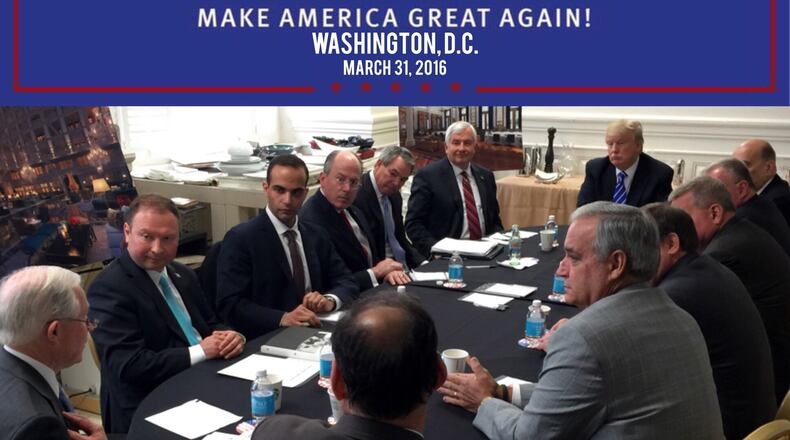On a cold Friday last January, 29-year-old George Papadopoulos bet his reputation on the post-truth nature of Donald Trump's Washington.
The young international researcher, who had been named to the Trump campaign’s foreign policy team 11 months earlier, had already witnessed some ground-breaking precedents that month.
Trump had been sworn in as president only seven days earlier, after which his press secretary had insisted that reporters – against the evidence generated by their own eyes – had just witnessed the largest inauguration “both in person and around the globe.”
The press secretary was merely providing “alternative facts,” a more inventive Trump explainer said.
Then there was the fabulous fib – one of many – that had helped put Trump in the White House: “We’re going to build a wall, and Mexico will pay for it.”
Something else happened that same cold Friday, later in the evening. Trump met with FBI Director James Comey. “I need loyalty, I expect loyalty,” Comey would swear the new president told him.
Papadopoulos’ own date with the FBI had come hours earlier, but perhaps he can be forgiven for believing the fix was already in. The prosecutorial statement about his guilty plea, made public Monday, implies that he had no lawyer at his side for that first encounter.
Neither do we know whether Papadopoulos sought the advice from the Trump camp prior to his interview with FBI agents. But again, the guilty plea suggests that the youngest member of Trump's foreign policy team did — and was told something like this: "Everything happened just the way it happened, but before you joined the campaign."
For this is precisely what Papadopoulos told the FBI agents.
Before he joined the Trump campaign in early March 2016, when he was still director of an international energy center in London, Papadopoulos said he met an “an overseas professor” who promised him Russian “dirt” on Hillary Clinton and “thousands of emails” from the same source. An odd coincidence, he admitted.
He met a “female Russian” and a purported contact at Russia’s foreign ministry, too – but before he joined the Trump campaign, Papadopoulos told the FBI.
A good book is currently making the rounds. “How the Right Lost Its Mind” is the work of Charles Sykes, a former conservative Wisconsin radio talk show host. He documents the slide of rightward political thought from the erudition of William Buckley to more visceral current appeals by the likes of Sarah Palin – and Trump.
In the chapter on “post-truth politics,” Sykes echoes what many others have noted — that modern politics has become less cognitive and more tribal.
“Many voters use information not to discover what is true, but rather to reinforce their relationship to their group or tribe. They use reason to confirm or justify the outcome they want,” Sykes writes.
Papadopoulos placed loyalty to his tribe above the pursuit of truth. His problem was that the FBI agents quizzing him weren’t members of his tribe.
At the Oct. 5 hearing at which Papadopoulos pleaded guilty, federal prosecutors made clear that they were in possession of emails, text messages, Skype records, Internet searches and location data – all of which proved the young man, who had since turned 30, had lied to them.
In truth, Papadopoulos had met the unnamed “professor” a week or so after he joined the Trump campaign in early March 2016. He had first met a certain “female Russian,” whom he at first believed to be Putin’s niece, on March 24. This was three days after a “national security” meeting of Trump and his campaign advisers.
The sequence could be important. It means Papadopoulos was cultivated as Trump representative – not as a free-lancer.
Also, that March 21 “national security” meeting was attended by Trump and Jeff Sessions, who was then still an Alabama senator. At that gathering, Papadopoulos “stated, in sum and substance, that he had connections that could help arrange a meeting between then-candidate Trump and President Putin,” according to court documents.
It was on April 26, over breakfast at a London hotel, that the aforementioned “professor” told Papadopoulos of “thousands of Clinton’s emails” that were now available.
That date, too, is important. An Atlanta cyber-security firm traced the Russian hacking of the email account of John Podesta, chairman of the Clinton campaign, to March 19, 2016.
None of this is proof of collusion. But small fish though he is, Papadopoulos and his timeline call into question the blithe professions of ignorance that came last year from Donald Trump and his campaign.
It is safe to say that George Papadopoulos’ faith in a post-truth Washington was seriously shaken by Feb. 16 of this year. That’s when he had his second interview with the FBI. He brought a lawyer, the record shows.
One day later, Papadopoulos deactivated his 12-year-old Facebook account with its mentions of the “professor” and a Russian character or two. He dropped his old cell phone number and got a new one.
But it was too late. In July, returning from overseas, Papadopoulos was arrested at Dulles International Airport. Prosecutors say he is still cooperating. If he’s lucky, he could escape with as little as six months in prison and a felony on his record.
Nonetheless, Papadopoulos was formally ousted from the tribe on Tuesday morning, via Twitter. "Few people knew the young, low level volunteer named George, who has already proven to be a liar," President Trump wrote.
About the Author
The Latest
Featured




